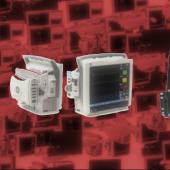-
Synlab Italia suspends operations following ransomware attack
Synlab Italia has suspended all its medical diagnostic and testing services after a ransomware attack forced its IT systems to be taken offline.
- April 22, 2024
- 11:27 AM
 0
0
-
University of Michigan employee, student data stolen in cyberattack
The University of Michigan says in a statement today that they suffered a data breach after hackers broke into its network in August and accessed systems with information belonging to students, applicants, alumni, donors, employees, patients, and research study participants.
- October 23, 2023
- 03:34 PM
 0
0
-
Misconfigured Meta Pixel exposed healthcare data of 1.3M patients
U.S. healthcare provider Novant Health has disclosed a data breach impacting 1,362,296 individuals who have had their sensitive information mistakenly collected by the Meta Pixel ad tracking script.
- August 22, 2022
- 02:16 PM
 1
1
-
Utah medical center hit by data breach affecting 582k patients
Utah Imaging Associates (UIA), a Utah-based radiology center, has announced a data breach affecting 582,170 people after their personal information was exposed.
- November 19, 2021
- 10:35 AM
 0
0
-
Northern Ireland suspends vaccine passport system after data leak
Northern Ireland's Department of Health (DoH) has temporarily halted its COVID-19 vaccine certification web service and mobile apps following a data exposure incident.
- July 28, 2021
- 06:50 AM
 1
1
-
Indian government sites leaking patient COVID-19 test results
Multiple Indian government department websites are leaking COVID-19 lab test results for patients online. These reports uploaded by testing labs across the country as part of the national 'test, trace, isolate' efforts, expose patient's details, test site location, COVID-19 test results, dates, and the healthcare provider's info.
- January 05, 2021
- 04:45 AM
 0
0
-
Researchers detail bug in wireless devices impacting critical sectors
A vulnerability affecting components used in millions of critical connected devices in the automotive, energy, telecom, and medical sector could let hackers hijack the device or access the internal network.
- August 19, 2020
- 07:19 AM
 0
0
-
Ryuk Ransomware Keeps Targeting Hospitals During the Pandemic
The Ryuk Ransomware operators to continue to target hospitals even as these organizations are overwhelmed during the Coronavirus pandemic.
- March 26, 2020
- 06:08 PM
 4
4
-
Ransomware Gangs to Stop Attacking Health Orgs During Pandemic
Some Ransomware operators have stated that they will no longer target health and medical organizations during the Coronavirus (COVID-19) pandemic.
- March 18, 2020
- 06:36 PM
 5
5
-
Critical MDhex Vulnerabilities Shake the Healthcare Sector
Critical vulnerabilities have been discovered in popular medical devices from GE Healthcare that could allow attackers to alter the way they function or render them unusable.
- January 23, 2020
- 02:01 PM
 2
2
-
Bug in Anesthesia Machines Allows Changing Gas Mix Levels
A vulnerability in the firmware of some anesthesia machines used in hospitals could be abused to change normal functionality up to the point of adjusting the level of inhalational substances.
- July 09, 2019
- 04:45 PM
 0
0
-
Critical Bug in Infusion System Allows Changing Drug Dose in Medical Pumps
Researchers discovered two vulnerabilities in Alaris Gateway Workstations that are used to deliver fluid medication. One of them is critical and an attacker could leverage it to take full control of the medical devices connecting to it.
- June 13, 2019
- 02:52 PM
 1
1
-
New Malicious Medical DICOM Image Files Cause HIPAA Headache
Malicious DICOM files can be crafted to contain both CT and MRI scan imaging data and potentially dangerous PE executables, a process which can be used by threat actors to hide malware inside seemingly harmless files.
- April 15, 2019
- 05:30 PM
 0
0
-
Medical IoT Devices with Outdated Operating Systems Exposed to Hacking
Medical IoT (IoMT) devices are left exposed to attacks because of outdated or legacy operating systems which, in many cases, are very easy to hack into and expose a throve of sensitive patient data, highly sought over on the black market.
- March 11, 2019
- 04:00 PM
 0
0
-
Hackers Can Falsify Patient Vitals
Hackers can falsify patients' vitals by emulating data sent from medical equipment clients to central monitoring systems, a McAfee security researcher revealed over the weekend at the DEF CON 26 security conference.
- August 14, 2018
- 06:46 AM
 1
1
-
Brainjacking: A Potentially Deadly Type of Hacking
Hacking the brain of someone with an implanted medical device is not a far-fetched illusion. While at one time a concept relegated to hair-raising Hollywood movies, scientists in Belgium have found that a wireless brain implant, known as a neurostimulator, can be hacked using off-the-shelf materials. By utilizing remote exploitation,
- April 19, 2018
- 09:45 AM
 1
1






















